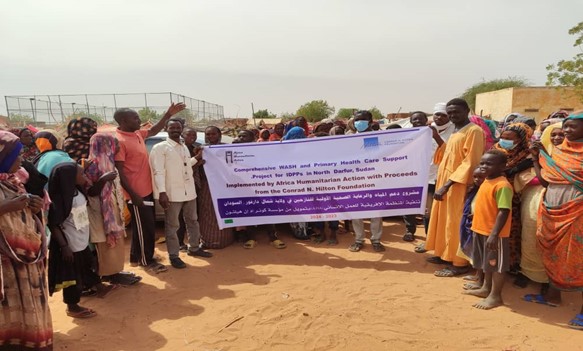AHA in Uganda operates in two regions: Central and Western Uganda. AHA Uganda supported
six primary health care facilities and four National Referral Hospitals. The Central region which
includes the districts of Kampala, Wakiso and Mukono hosts refugees from over 15 countries of
origin, while the western region which included Kyaka II refugee settlement in Kyegegwa district
hosts mainly refugees from the DRC. In 2022, AHA reached 233,946 refugees in Uganda. AHA
Uganda partnered with UNHCR and Farmacéuticos Mundi (Farmamundi) to provide access to
health services for all refugees living within the urban area and Kyaka II refugee settlement.

Uganda
1995 – Present
Kampala District, Kyegegwa, and Kyaka II Refugee Settlement

115,947
Total Beneficiaries in 2023


1,330,820
Total Funds Spent in 2023
Programs

-
Yes
-
No
-
Yes
-
No
-
No
-
No
-
No
-
No

Nutrition
Improving the nutritional well-being of the refugee population
AHA in addition to the normal UNHCR project, carries out two other projects that are funded by WFP which are aimed at improving the nutritional well-being of the refugee population in Rwamwanja and Kyaka II i.e. Supplementary Feeding Program and Food Basket Monitoring to ensure that refugees receive food entitlements according to the agreed standard distribution system and rations. In 2018, AHA provided both preventive and curative nutrition programmes including IYCF/e activities to children through the establishment of 3 breast feeding corners and mother baby pair counselling. Screened malnutritioned refugees in coordination with the VHTs. SFP, OTC and ITC programs were implemented for U5s with malnutrition

Wash

healthcare
Access for government primary health care services
AHA currently operates in two districts; Kyegegwa & Kamwenge Districts hosting Congolese refugees from DRC in the region, each providing communities with access to essential medical services. AHA has a collaborative relationship with the district health offices where it operates its projects. The scope of health services include; extensive health education through static and outreach posts, EPI, ANC and safe motherhood services, reproductive health, OPD and laboratory services, ART clinic and HIV /AIDS services including counselling and PEP, referral services. In 2018, AHA Uganda addressed the inadequate access of government primary health care services by providing services in a range of sectors to PoCs through 5 health centres and 12 health outposts. In collaboration with the Village Health Teams (VHTs), AHA strengthened surveillance for potential disease outbreak like Cholera and Ebola leading to a successful prevention of outbreaks. A total of 140,232 PoCs benefited from the wide range of health care services. The programme benefited both refugees and the host community

Livelihood

protection

food security

shelter

logistics
stories
Explore updates from the field, testimonials and events
- 18 October 2024
Updates from AHA Uganda
AHA Uganda, in collaboration with UNHCR, Farmacéuticos Mundi (Farmamundi), and the Pfizer Foundation, has made significant strides in delivering critical
- 23 August 2024
AHA Featured in World Humanitarian Day Article
AHA has been featured in an article about World Humanitarian Day. The article highlights AHA's impactful work alongside profiles of
- 05 July 2024
Testimony from a First Time Young Mother (FTYM) Assisted by KOICA/UNFPA through AHA on IGA, Kiziba Refugee Camp
The testimony was collected after written consent was given by the young mother. My name is NYIRABEGA TUYISENGE, a 23
- 03 July 2024
2024 Mid Year Newsletter
As AHA enters the middle of the year, Here are some of the highlights of AHA’s humanitarian progress, changes and
- 18 April 2024
Water trucking for IDPS in North Darfur
The protracted crises in Darfur, combined with a year long fighting between the Sudanese Armed Forces and the Rapid Support
Signup for Updates
Stay up-to-date on stories from the field, news, events, and program updates by joining our mailing list.






